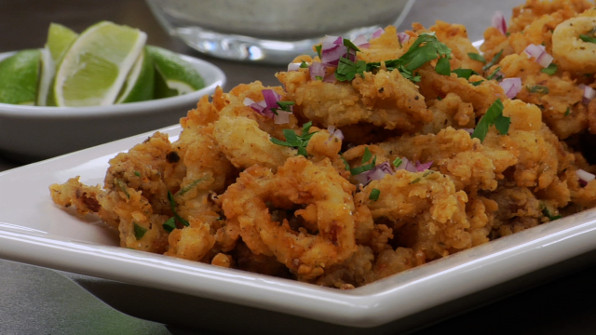Developing a sustainable food production model that can feed 10 billion people around the world by 2050 remains a challenge, though many scientists have proposed ideas that could contribute to a solution. Now, one researcher says we should be looking at eating more Cephalopods…
 Calamari: Breaded, deep-fried Squid Rings, cooked just right, so they’re neither
Calamari: Breaded, deep-fried Squid Rings, cooked just right, so they’re neither
raw nor rubbery… Here’s hoping an expanded Caphalopod
producing industry will help reduce prices!
What’s a Cedphalopod?
Good Question. You probably know them better as Squid, Octopus and Cuttlefish. I’m not so sure about Cuttlefish, but I am already a fan of the former two menu items.
Now, a researcher at the University of Copenhagen suggests we should be looking in that direction for future food needs.
What’s the deal, anyway?
Professor Ole G. Mouritsen from the Department of Food Science at the University of Copenhagen (UCPH FOOD) in Denmark, says: “We know that wild fish stocks are threatened and we are finding it difficult to establish new aquaculture because of problems with pollution. At the same time, the global Cephalopod population […] is growing, which is why we have investigated whether there may be grounds for getting people to eat [more] Cephalopods in those parts of the world where there is no widespread tradition for it,”
Together with the chef Klavs Styrbaek, he is the author of the article ‘Cephalopod Gastronomy – A Promise for the Future’ published in the English scientific journal Frontiers in Communication. The article is part of a worldwide study of Cephalopod species under the initiative CephsInAction.
“The project includes broad research into Cephalopods – some are carrying out research in psychology, while others are conducting research in how to transfer the movement patterns of Cephalopods to robots. We have been invited because there is a need to look at how to make use of the Cephalopods in food,” says Mouritsen.
Climate Change may actually help Cephs…
As the waters of the world’s oceans get warmer, Mouritsen notes, natural predators of Caphalopods (mainly large fish) are declining, which may be contributing to the rise in Ceph populations. At the same time, warmer water doesn’t seem to bother Squid and Octopi. Imagine that!
Mouritsen concludes: “The growth in the population applies to all species — including those you can eat. Cephalopods are filled with healthy nutrients like proteins, minerals, omega-3 fatty acids and a number of micronutrients, making them an obvious future food resource.”
By nature, an efficient way to produce Protein…
Cephalopods are extremely efficient at converting food into muscle, which means they can contribute healthy proteins to food for human consumption. One challenge, however, is that they are very difficult to breed in aquaculture because young Cephalopods require a very special, very costly food. My observation: Get somebody working on that, now…
But making better use of what is currently an underused natural population could make an impact on the food supply. The global catch of Cephalopds annually is a mere 4.8 million tons and represents only 2 percent of the world’s protein consumption. TGhere43 appears to be lots of room for expansion.
Cooking them right could make the difference in mass acceptance…
Mouritsen says some folks consider Cepahlopods bland in flavour and rubbery in texture. AlI can say is, they’ve probably never tried them cooked properly. Mouritsen agrees: “I believe that Cephalopods will become a widespread food around the world if we can succeed in making dishes with Cephalopods taste so good that there will also be a commercial market for them. We will eat Cephalopods because of the taste experience.”
Squid and Octopi are less effected by pollutants than other marine species, are low in Saturated Fat, can trigger your Umami taste sense, and freeze well. What more could you ask for?
My take…
I would love to eat more Squid and Octopus, but the cost currently is prohibitive for me (and most average families). One hopes that successful farming of these species and larger wild harvests will bring the cost down. And I heartily agree with Mouritsen that cooks at all levels must get on the bandwagon and not only learn how to cook these foods properly, but to start doing flavourful, creative things with them to help popularize them.
~ Maggie J.

